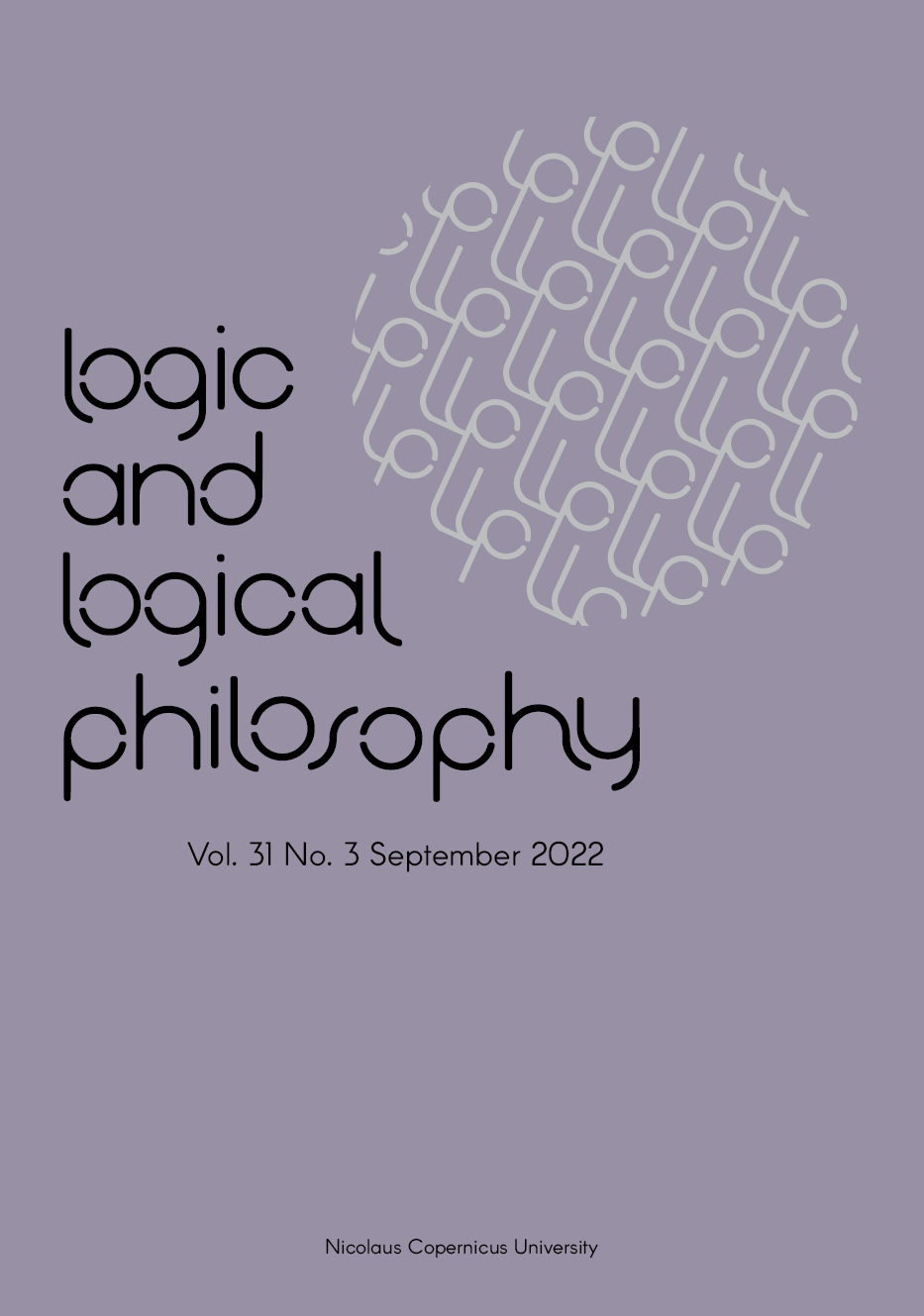Logics for Knowability
DOI:
https://doi.org/10.12775/LLP.2021.018Keywords
knowability, public announcement logic, arbitrary public announcement logic, expressivity, axiomatizations, decidabilityAbstract
In this paper, we propose three knowability logics LK, LK−, and LK=. In the single-agent case, LK is equally expressive as arbitrary public announcement logic APAL and public announcement logic PAL, whereas in the multi-agent case, LK is more expressive than PAL. In contrast, both LK− and LK= are equally expressive as classical propositional logic PL. We present the axiomatizations of the three knowability logics and show their soundness and completeness. We show that all three knowability logics possess the properties of Church-Rosser and McKinsey. Although LK is undecidable when at least three agents are involved, LK− and LK= are both decidable.
References
Ågotnes, T., P. Balbiani, H. van Ditmarsch, and P. Seban, “Group announcement logic”, Journal of Applied Logic 8: 62–81, 2010. DOI: https://doi.org/10.1016/j.jal.2008.12.002
Ågotnes, T., H. van Ditmarsch, and T. French, “The undecidability of quantified announcements”, Studia Logica 104 (4): 597–640, 2016. DOI: https://doi.org/10.1007/s11225-016-9657-0
Artemov, S., and M. Fitting, “Justification logic”, in E. N. Zalta (ed.), The Stanford Encyclopedia of Philosophy, Metaphysics Research Lab, Stanford University, 2020. https://plato.stanford.edu/entries/logic-justification/
Ayer, A. J., Language, Truth and Logic, Victor Gollancz Ltd, London, 1936.
Balbiani, P., A. Baltag, H. van Ditmarsch, A. Herzig, T. Hoshi, and T. De Lima, “ ‘Knowable’ as ‘known after an announcement’ ”, Review of Symbolic Logic 1 (3): 305–334, 2008. DOI: https://doi.org/10.1017/S1755020308080210
Balbiani, P., and H. van Ditmarsch, “A simple proof of the completeness of APAL”, Studies in Logic 8 (1): 65–78, 2015.
Blackburn, P., M. de Rijke, and Y. Venema, Modal Logic, Cambridge University Press, Cambridge, 2001. DOI: https://doi.org/10.1017/CBO9781107050884
Brogaard, B., and J. Salerno, “Fitch’s paradox of knowability”, in E. N. Zalta (ed.), The Stanford Encyclopedia of Philosophy, Metaphysics Research Lab, Stanford University, fall 2019 edition, 2019. https://plato.stanford.edu/entries/fitch-paradox/
Church, A., “First anonymous referee report on Fitch’s ‘a definition of value’ ”, sent to E. Nagel, co-editor of The Journal of Symbolic Logic, 1945.
Dummett, M., “Realism”, Synthese 52 (1): 55–112, 1982. DOI: https://doi.org/10.1007/BF00485255
Dummett, M., “Victor’s error”, Analysis 61 (1): 1–2, 2001. DOI: https://doi.org/10.1093/analys/61.1.1
Fan, J., “Unknown truths and false beliefs: Completeness and expressivity results for the neighborhood semantics”, Studia Logica, 2021. DOI: https://doi.org/10.1007/s11225-021-09950-5
Fitch, F. B., “A logical analysis of some value concepts”, The Journal of Symbolic Logic 28 (2): 135–142, 1963. DOI: https://doi.org/10.2307/2271594
French, T., and H. van Ditmarsch, “Undecidability for arbitrary public announcement logic”, pages 23–42 in Advances in Modal Logic 7, College Publications, London, 2008.
Goldblatt, R., Axiomatising the Logic of Computer Programming, Springer-Verlag, 1982.
Hintikka, J., Knowledge and Belief, Cornell University Press, 1962.
Liu, M., “On the decision problems of some bundled fragments of first-order modal logic”, Master Thesis, Technical report, Peking University, 2019.
Padmanabha, A., R. Ramanujam, and Y. Wang, “Bundled fragments of first-order modal logic: (un)decidability”, pages 43:1–43:20 in S. Ganguly and P.K. Pandya (eds.), Proc. of 38th FSTTCS, vol. 122 of LIPIcs, 2018.
Plaza, J. A., “Logics of public communications”, pages 201–216 in Proc. of the 4th ISMIS, Oak Ridge National Laboratory, 1989.
Salerno, J. (ed.), New Essays on the Knowability Paradox, Oxford University Press, Oxford, UK, 2009. DOI: https://doi.org/10.1093/acprof:oso/9780199285495.001.0001
Tennant, N., The Taming of the True, Oxford University Press, Oxford, UK, 1997.
van Benthem, J., “What one may come to know”, Analysis 64 (2): 95–105, 2004. DOI: https://doi.org/10.1093/analys/64.2.95
van Benthem, J., “One is a lonely number: on the logic of communication”, pages 96–129 in Logic colloquium 2002, Lecture Notes in Logic, vol. 27, A. K. Peters, 2006. DOI: https://doi.org/10.1017/9781316755723.006
van Ditmarsch, H., and T. French, “Quantifying over Boolean announcements”, 2018. https://arxiv.org/abs/1712.05310
van Ditmarsch, H., T. French, and J. Hales, “Positive announcements”, Studia Logica, 2020. DOI: https://doi.org/10.1007/s11225-020-09922-1
van Ditmarsch, H., and B. Kooi, “The secret of my success”, Synthese 151: 201–232, 2006. DOI: https://doi.org/10.1007/s11229-005-3384-9
van Ditmarsch, H., W. van der Hoek, and P. Iliev, “Everything is knowable – how to get to know whether a proposition is true”, Theoria 78 (2): 93–114, 2012. DOI: https://doi.org/10.1111/j.1755-2567.2011.01119.x
van Ditmarsch, H., W. van der Hoek, and B. Kooi, Dynamic Epistemic Logic, volume 337 of Synthese Library, Springer, 2008. DOI: https://doi.org/10.1007/978-1-4020-5839-4
Wang, Y., “Beyond knowing that: A new generation of epistemic logics”, in H. van Ditmarsch and G. Sandu (eds.), Jaakko Hintikka on Knowledge and Game-Theoretical Semantics, Outstanding Contributions to Logic 12, Springer, 2018. DOI: https://doi.org/10.1007/978-3-319-62864-6_21
Williamson, T., “On knowledge of the unknowable”, Analysis 47 (3): 154–158, 1987. DOI: https://doi.org/10.2307/3328679
Downloads
Published
How to Cite
Issue
Section
License
Copyright (c) 2021 Logic and Logical Philosophy

This work is licensed under a Creative Commons Attribution-NoDerivatives 4.0 International License.
Stats
Number of views and downloads: 1945
Number of citations: 0







